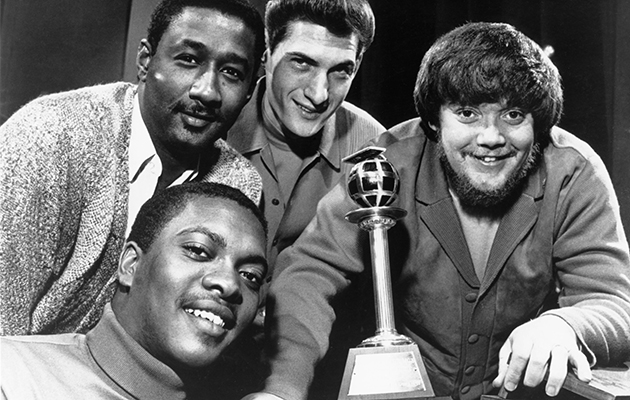JONES: I got the idea that it has going to be a hit round about the time I enrolled at Indiana University. I walked out of the attention almost as soon as it happened. I would have to drive back to Tennessee 400 miles at weekends to play sessions, then back to Indianapolis. It was a power of stress.
CROPPER: Booker took the opportunity and the money and all that to get a degree in college. I took the opportunity to work a little harder in the studio. And the good thing about Booker wanting to go to college – there may have never been an Isaac Hayes! Because we had to have a keyboard player. So that worked out real good too.
JONES: [The bi-racial nature] of the band didn’t seem like such a big deal at the time.
CROCKER: The first record didn’t have any pictures of the guys on it, so nobody knew anyway. But then we went and played shows where we couldn’t eat in the same restaurants. We would have to stay in motels outside the city, where they needed to rent rooms. But we never had a problem once we started playing.
JONES: Then there was the question of integration, which was a problem for some people. But we never actually discussed the topic among ourselves. It was just understood that this was something we were pushing forward with, just like we were pushing forward with the music. We were pushing to keep the sound simple and funky and we didn’t talk about that, either. It was an understanding, unspoken. Steve Cropper’s heroes were blues players as well as country players. It was a stew that I don’t think could have happened anyplace else.
STEINBERG: After a couple of years, I had four young daughters. And I didn’t want my daughters to grow up without a daddy. So I let [the M.G.’s] go on their way, and I went mine. And I think I made the right decision, because all four of my daughters are college graduates with high, high, high-ranking jobs. I found a day-job, didn’t pay a whole lot of money, and worked at Club Paradise in Memphis for 18 years, part of a house-band that opened for Count Basie, Duke Ellington, BB King, all of them. If I had to do it all over again, there would be no hesitation. It came out beautiful and perfect for me.
CROPPER: There’d been absolutely no thought of being in a band. We were forced into it by putting “Green Onions” out. It was an all in-house accident. If the record hadn’t of hit, we’d still just have been a back-up band.
JONES: Even if somebody else made the record, I’d be glad it got made.
___________________________
FACT FILE
Written by: Booker T. Jones, Steve Cropper, Lewie Steinberg, Al Jackson Jnr.
Performers: Booker T. Jones (Hammond organ), Steve Cropper (guitar), Lewie Steinberg (bass), Al Jackson, Jnr. (drums)
Produced by: Jim Stewart
Recorded at: Stax Studios, Memphis, Tennessee
Released as a single: May 1962
Highest US chart position: 3
___________________________
TIMELINE
April 1962
“Green Onions” is recorded as a B-side to “Behave Yourself”, during downtime for a radio jingle session.
May 1962
Memphis R’n’B DJs prefer “Green Onions”, and flip the sides. Its makers name themselves Booker T & The MG’s.
July 1962
“Green Onions” reaches US No 3, only the second big national hit for the fledgling Stax.
1973
In the first of many revivals, “Green Onions” is one of a nostalgic centrepiece of George Lucas’s movie American Graffiti. “My favourite use of it,” says Booker.
1980
Cropper and “Duck” Dunn play it again as part of The Blues Brothers band, on tour and screen.



